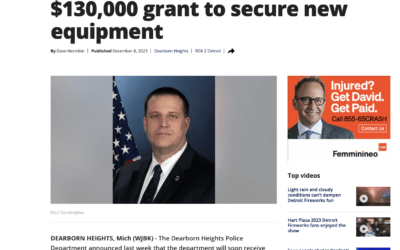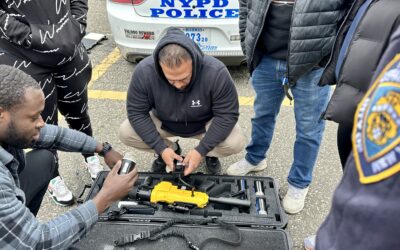New technology that could help police slow the ‘high-speed chase’
By: Bill Riales, wkrg.com
MOBILE, Ala. (WKRG) — In the first four months of 2019, News 5 has covered at least two dozen police chases, some ending with injuries, and some turned deadly. Statistics show many of those chases were unnecessary.
In the past few years, one company, Starchase LLC has been developing and promoting technology that could help officers avoid injuries and even death by slowing the chase.
It includes a system mounted on patrol cars that fires a small projectile with a strong adhesive that sticks to a vehicle police might be chasing. The device is a sensor that can be tracked by GPS.
“When the technology is used effectively, it slows everything down as far as the events that you normally think of with a high-speed pursuit,” says Starchase’s Trevor Fischbach. “You drop the adrenaline–you’re better able to manage the existing fleet of vehicles you have.”
The Starchase system is now being used by police departments and state troopers in 21 states. And for good reason.
Each year more than 50 thousand people are injured in police chases, including police officers, the suspects being chased, and often, innocent bystanders.
Shavelle Campbell is one of them, the care she and her daughter was in was hit by a stolen car being chased by Mobile Police.
She was injured, “on my left side, my shoulder–my arm still gets numb,” she says.
But too often, police chases turn deadly, like the one on Interstate 10 in Baldwin County April 1st.
Father and son Joseph and Kevin Andrews were killed as deputies chased a car that ended up going the wrong way crashing into the Andrews car.
Each year on average, 355 people lose their lives in police chases. About a third of those victims are innocent bystanders, according to the Bureau of Justice statistics. Statistics also show that about 91% of those chases are in response to non-violent crimes.
“You have to look at it from a risk-management standpoint and how do you manage those risks? And the way to manage those risks is by writing good policy and good training,” according to Tom Gleason, a retired police Captain, and an advisory board member of Pursuitsafety.org. The organization works to reduce injuries and deaths with regard to police pursuits.
Gleason says one of the keys is for police departments to have a clearly written pursuit policy. Those policies vary from department to department.
Pursuitsafety.org characterizes police pursuit policies as restrictive, discouraging or discretionary. A discretionary policy is the least restrictive and could lead to an individual officer making the decision to pursue or not to pursue without input from supervisors.
We wanted to know about the written pursuit policies police departments along the Gulf Coast have. Florida departments responded to our request for their policies, most of which appear to be restrictive policies, guarding against engaging in pursuits that don’t involve serious crimes. The Alabama departments we contacted either declined or did not respond to our request.
Many of the chases News 5 has covered since the first of the year involve the Mobile Police Department, which did not respond to a request for their written pursuit policy. But Chief Lawrence Battiste has talked about their approach to pursuits in the past.
“If we’re going to be pursuing, we’re going to be taking somebody off the street that has shown the propensity to be violent and to have a total disregard for the public safety,” said Battiste.
Mobile Police have at least looked at the Starchase system just in the past few weeks. At the moment, they have determined that the $6,000 price tag to equip each vehicle is too steep.
[wufoo username=”starchasellc” formhash=”k9kspox114pwqn” autoresize=”true” height=”1076″ header=”show” ssl=”true”]



